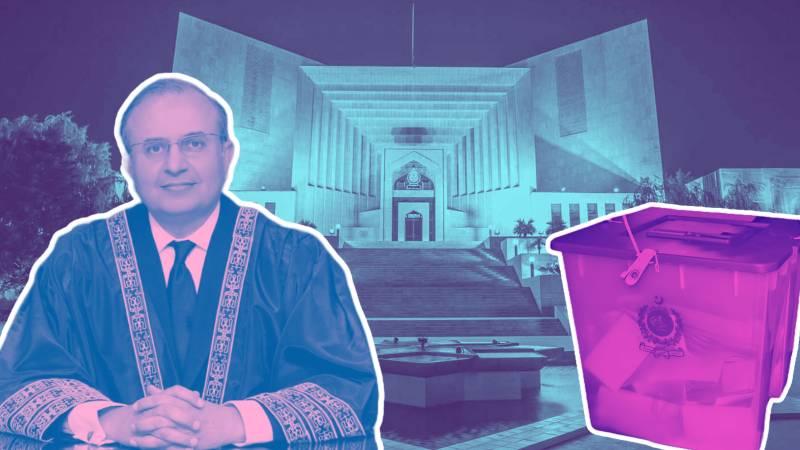
The Supreme Court has observed that under Article 17(2) of the Constitution, individuals not only have the right to form or be a member of a political party but also have the right to contest elections and to vote for a candidate of their choice.
The top court made these observations while accepting the nomination papers of Pakistan Tehreek-e-Insaf (PTI) candidate Tahir Sadiq.
"Other rights, even the most basic, are illusory if the right to vote is undermined," observed Justice Mansoor Ali Shah, who authored a five-page written order while ruling on Sadiq's nomination papers. The top court has further observed that no right is more precious in a free country than that of having a voice in the election of those who make the laws under which, as good citizens, we must all live.
"When viewed against the backdrop of the constitutional value of 'political justice', Article 17(2) remains hollow unless it also recognises the right of citizens to choose their representatives fairly and freely from amongst the candidates," observed Justice Shah, adding that the right of citizens to participate in national elections as voters is the core of the democratic form of government.
"This right is also an expression of the choice of the citizens, which finds further support under Article 19 of the Constitution. In exercise of these fundamental rights, citizens shape their destiny by forming the government they want."
He further observed that elections stand as a manifestation of a nation's collective will, reflecting its citizens' diverse voices and choices.
"In this democratic process, individuals exercise their right to vote, contributing to the formation of a representative government. The rights involved are not only of those participating in the elections but also of the public."
The court held that the working of democracy depends on whether the people can decide the fate of the elected form of government. "It depends on the choices that people make in different ways."
Sadiq'sThe Returning Officer had rejected Sadiq’s nomination paper for NA-49 Attock-I on December 30 because a court had declared him as a proclaimed offender.
However, an appellate tribunal accepted his nomination paper. However, the nomination papers were challenged through writ petitions before the Lahore High Court (LHC), which rejected Sadiq's nomination papers on January 16, 2023, on the grounds that the petitioner was a proclaimed offender.
"It is also important to note that the disadvantage, if any, for being a proclaimed offender ordinarily relates only to the case in which a person has been so proclaimed, and not to the other cases or matters which have no nexus to that case," the Supreme Court observed, adding that there was no law which disqualifies a proclaimed offender from contesting elections.
"The Returning Officers, the Appellate Tribunals or the courts cannot on their own create such additional disqualification, without the backing of law," Justice Shah ruled in his judgement.
Why are there qualifications and disqualifications for candidates?
The top court also spent some time explaining the aim of prescribing qualifications and disqualifications for candidates hoping to contest the elections. The court explained that its purpose was was to maintain the integrity and effectiveness of the political process.
It added that they are designed to ensure that individuals holding public office meet certain standards.
"Qualifications and disqualifications of a candidate for the electoral process must, therefore, be clearly spelled out in the Constitution or the law. Otherwise, electoral laws must be interpreted in favour of enfranchisement rather than disenfranchisement so that maximum choice remains with the voters to elect their future leadership," the order noted.
"With this approach rooted in the high constitutional rights and values, the courts are to deal with the matters of acceptance or rejection of the nomination papers filed for contesting elections."
The top court has further observed that Articles 62 and 63 of the Constitution when read with Sections 231 of the Elections Act, provide for the qualification and disqualification of a candidate. However, nowhere does it include that a candidate can be disqualified from being elected as a member of Parliament simply for being a "proclaimed offender".
"The grounds provided for rejection of a nomination paper in Section 62(9) of the Act also do not empower the Returning Officers to reject the nomination paper of a candidate on the ground of his being a proclaimed offender," the court observed.
"Although no provision of the Act has been pointed out to us that requires the necessary presence of the candidate during the electoral process, we may observe that if there is any such provision, the absence of the candidate may have its own consequences under that provision, but his nomination paper cannot be rejected on such ground unless the legislature so provides in Section 62(9) of the Act."
The top court subsequently directed the Election Commission of Pakistan (ECP) to ensure that all the necessary steps to be taken in the electoral process are completed immediately so that Sadiq can contest the election on the scheduled date for the said seat without fail.

